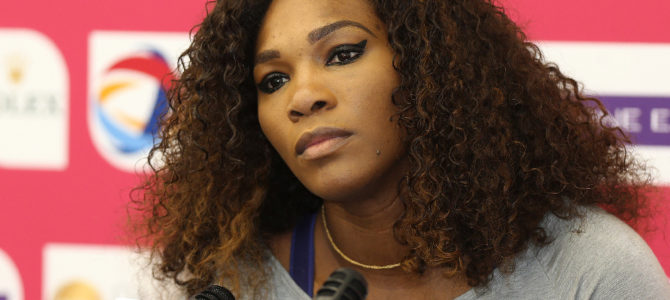
Serena Williams is an indomitable force on and off the tennis court. She’s forging pathways for girls and women from hard upbringings to chase after prosperous futures. If only she were not also using her platform to perpetuate a false narrative and victim mentality by celebrating Black Women’s Equal Pay Day.
In Fortune this week, Williams calls out what she refers to as the “long neglected” fact that black women earn 63 cents for every dollar that a white man makes, which is even greater than the alleged pay gap for all women of 79 cents. Despite her tremendous success, Williams sees herself as similar to the other 24 million black women who are struggling against discrimination.
Williams discusses her triumphs in the face of adversity and discrimination starting with childhood due to her race and sex. Any discrimination she may have faced in the sports world, professional world, and her community is despicable. There’s no better revenge than international success.
No One Needs to Stay a Victim
Williams’s success may not be the norm, but she’s not the outlier either. Black women in America are not a homogenous group sharing the same experiences, shouldering the same burdens, and destined to the same fate. As a black woman, I challenge the idea that every black woman in America is cheated by 37 cents on the dollar in her paycheck each week simply because of her skin tone.
These pay gaps set women up to think of themselves as victims—powerless to change their outcomes. We are constantly told that women earn about 80 percent of what men make and that it’s driven by sex discrimination. Now, we learn that the pay gap for black women is even wider.
However, these calculated gaps rest on an inaccurate manipulation of data. The oft-cited Department of Labor statistic that women earn only 79 cents of what men make compares the average salaries of all men and women with full-time jobs. When controlling for factors such as hours worked by men and women, age, occupation, job title, education, and seniority, the difference in pay shrinks to a few cents. The pay gap also ignores the nuances of industries where some women earn more than men such as therapists, social workers, and teachers’ aides.
Women taking time out of the workforce to have a family plays a massive role in their earnings as well as opportunities for career advancement.
We Are the Product of Our Choices
The black women’s pay gap is as absurd as the women’s pay gap. Black women are the backbones of their families and communities. They lead more than half (54 percent) of black families with children under 18, serving as breadwinners and primary caretakers. Nearly two out of three black women are in the workforce, giving them the highest labor force participation rate among women. As with all women, the choices they make in selecting careers and throughout their careers affect their earnings potential.
Black women are drawn to jobs and careers in health care, human services, and education because they offer the chance to care for the educational, physical, and emotional needs of their families and communities. According to a 2016 Georgetown study, 20 percent of degree holders in human services and community organizing and 19 percent in social work were black, earning a median salary of about $40,000. Just 7 percent of blacks have STEM-related bachelor’s degrees, and they command a median annual salary of $84,000. Black women are overrepresented in jobs such as nursing, home health aides, and personal and home care aides. Although critical, these are not high-paying positions.
Black women are also resourceful and adept at creating opportunities for themselves. They comprise the fastest-growing demographic of small business owners in the nation, growing by 126 percent from 1997 to 2015. Those businesses are concentrated in personal care services such as hair and nail salons as well as health care and social assistance, which may provide stability and growth potential as the American population continues to age but are not higher-revenue sectors.
How to Actually Help Black Women
If we want to boost disposable income for black women, lowering their personal income tax and business tax rates is a great place to start. Scaling back costly and time-consuming occupational licenses, which make it difficult for black women to secure jobs and start businesses, is another area for policy reform.
We don’t need far-reaching legislation that aims to rectify perceived wrongs. Where discrimination exists, it should be exposed and prosecuted. Sex- and race-based discrimination are not necessarily behind the pay gap for black women, but rather the honorable career choices that they make to help others including their families.
Serena Williams hit the ball out of the court with her record numbers of tennis titles and will no doubt bring a winning attitude to the tech and fashion sectors. However, her focus on the black female pay gap is a missed ball that I hope others won’t pick up and run with.









